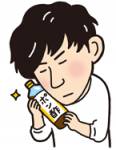
Sunmark Publishing Rights Highlights
and NEWS Mail--August 2019 Issue
Hello, I’m Kanako Kurokawa, a book editor and a staff member of the Rights Department at Sunmark Publishing.
As I’m writing this, we’re in the middle of tsuyu, the rainy and humid season in early summer in Japan.
When tsuyu is over, it will truly be summer!
Summer is my favorite of all the seasons because there are so many events to go to like BBQs, swimming in the ocean, summer festivals, and so on.
The thing that I’m looking forward to the most this summer is a trip to Ishigaki Island, the main island of the Yaeyama Islands in Okinawa Prefecture.
I’m planning to go for a drive, take a nap at the beach, and have some local dishes.
Until then, I’ll try to put more effort into my work.
Do you have plans for a summer vacation?
I wish you a happy summer!

If you have any questions or inquiries about this NEWS Mail, please contact Ms. Shino Kobayashi, Rights Manager (rights@sunmark.co.jp).
We’ll have a stand at the Beijing International Book Fair and the Frankfurt Book Fair.
From August 21st to 25th, Sunmark Publishing will have a stand at the Beijing International Book Fair as a part of the Japanese Collective Area, and then we’ll be at the Frankfurt Book Fair in October. Again this year, we’ll share a stand with our partner publisher in the US, Beyond Words, and will be in Hall 6.0 B120. We hope to meet any of you who are planning to come to either book fair!
ISBN978-4-7631-3756-2 C0030
253 pages / May 2019 / 1,400 yen (w/o tax)
A must-read for parents low on time and money!
Introducing an educational method that will dramatically raise your child’s grade-point average!
【A new educational method backed by neuroscience and 40 years of real results】
◎Dramatically raise a grade-point average.
◎Get accepted into the University of Tokyo and other top medical schools on the first try!
◎The growing popularity of Japan’s first “integration schools”
◎40 years of fostering actual results for over 50,000 people
◎The MaiPaso computer competition made “top group in Japan” 8 years in a row
◎Top prize in the Japan Kanji Aptitude Test
◎Winning the NHK All-Japan School Music Competition
And more
Hiroyuki Okubo, who has worked in a variety of professions including head of Ibaraki Prefecture’s Board of Education, discovered something extremely important in his 40 years of helping 50,000 students achieve real results, and through his experience applying neuroscience to education. That is the importance of education up to the age of 9, which defies the conventional wisdom of the education world. Making a proper switch in educational methods at age 9 can determine a child’s success. But why age 9?
The period of time when the brain is “growing,” deemed the “critical period,” is understood to be at age 9. Age 9 is when brain capacity expands, and the “soil” improves, so to speak. From age 10, this soil is nourished and fed by knowledge. This process allows children to grow naturally and parents to support their children without stress. It can influence a child’s future profession, annual salary and overall level of happiness.
Currently, however, learning and teaching styles make an abrupt change at age 6. That is when children are entering elementary school. From age 6, children are moved abruptly from the experience-based learning environment of preschool and nursery school to a classroom setting. Parents may not realize how much stress this puts on their kids.
In recent years, many kids are becoming introverts as they move from elementary school to an environment where they are suddenly expected to work and study hard. This is not unrelated to Japan’s recent “first-grade problem.”
Wanting to do something about this, author Okubo established Japan’s first nationwide integration school for children, where education styles are separated at age 9. The results have been largely better than anticipated.
It quickly grew into a reputable school, trusted by parents all over the country. A number of important people in the world of education, including former Minister of Education, Culture, Sports, Science and Technology (MEXT) Takeo Kawamura have visited the school to observe.
This book provides concrete information on how families can implement this new style of education. Education after age 10 is also covered in detail.
“I want to foster the abilities of as many Japanese children as possible. I want children in Japan to live happy lives.” – Hiroyuki Okubo
Children are steadily growing both physically and mentally. This book introduces the key to providing children and their families with fulfilling lives.
Chapter 1 Ability is determined during the critical period of age 9!
◎The brain is programmed to an “ideal development process”
◎The IQ of an 8- and 18-year-old are the same
Chapter 2 Skills that match the brain’s “development program”
◎The 6 multiple intelligences
◎Why do MBA elite use conventional products?
Chapter 3 4 ways to increase academic ability at home!
◎What is needed to stimulate the brain?
◎Soccer and swimming promote child development
Chapter 4 Foster human intelligence and strengthen the soul
◎The importance of “noncognitive skills,” as mentioned by Nobel Prize winner James Heckman
◎Leadership experience expands human intelligence to that of a 20-year-old
Chapter 5
◎Proper sleep alone will increase IQ by 10 points
◎ If you say “I’m busy, I’ll help you later,” be sure to follow up with “I can help you now”
When I walked into the kindergarten and elementary schools where Mr. Okubo was the principal, I remember thinking they were unlike any other schools I’d ever seen. The whole building was full of energy; children were greeting us with such loud voices I couldn’t help but smile. What a lovely atmosphere! All the children seemed to be enjoying the classes as well. It was so different from what I remembered as a kid.
It isn’t that school itself is important. What I learned from speaking with Mr. Okubo is that children want to grow up. If we help them develop their abilities before age 9, whether at home or at school, any child can be a star.
This book explains how Mr. Okubo’s teaching methods can be applied at home. He hopes to help every child grow into the best version of themselves.
This book is very beneficial. It makes raising children easier, lowering the burden on parents. Healthy and happy children turn a parent’s worries into fun. Recommend this book to a friend when you finish reading it yourself!
ISBN978-4-7631-3758-6 C0095
191 pages / May 2019 / 1,200 yen (w/o tax)
I want to quit, but I can’t.
This “comic book essay” teaches you how to rid yourself of small dependencies.
Wait, that’s an addiction, too?
Are you spending time and money on things that actually matter to you?
You use social media on the way to the bathroom
You didn’t used to drink, but now you have to have one after work.
Mail orders arrive almost weekly, but you often don’t remember what you’ve bought.
You want to break up with your partner, but you can’t.
You want to quit your job, but you can’t.
These may be real addictions.
A new book by Kona Shiomachi, author of the best-selling Why You Can’t Quit a Job That’s Killing You.
The Internet, alcohol, shopping, sugar, love or sketchy business activities.
Based on responses given by addiction specialists and winners of their war against addiction about how to quit, this book will help you change your ways.
Life is so much better when we quit things we don’t need.
Q&A with Dr. Oishi 1 – What’s the difference between those who live life thoroughly and those who ruin it?
Q&A with Dr. Oishi 2 – What’s going on inside the head of an addict?
Q&A with Dr. Oishi 3 – What should one do when they pinpoint an addiction?
Q&A with Dr. Oishi 4 – How do you know when a relationship is toxic? (abusive bosses, lovers and parents)

Certain words left a lasting impression on me while working on this book.
Addiction keeps you from focusing on what’s most important to you.
Beating addiction allows you to fully focus on what’s most important.
This book is produced from the stories of those who beat addiction and won happy lives. Both the author and I thought the word “addiction” didn’t apply to us, but when thinking about things in terms of “I want to quit this, but I can’t,” you find that the word “addiction” can be applied to many things.
Not just food, alcohol or gambling, but things like sketchy business endeavors and toxic relationships also fall under “addiction.”
Now it’s time for you to beat your addiction and start spending time and money on what’s most important to you.